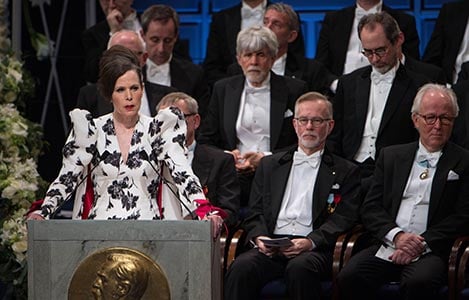Award ceremony speech
English
Swedish
Presentation Speech by Professor Sara Danius, Permanent Secretary of the Swedish Academy, Member of the Nobel Committee for Literature, 10 December 2017.

Professor Sara Danius delivering the presentation speech for the 2017 Nobel Prize in Literature at the Stockholm Concert Hall.
Copyright © Nobel Media AB 2017
Photo: Pi Frisk
Within a few pages of When We Were Orphans (2000) the main character receives a present. He is young, merely a boy. Unwrapping the present, he finds several sheets of paper. Have his friends played a joke on him? Finally, he unpacks an old leather case, and hidden in it – a magnifying glass.
The magnifying glass has no bearing on the plot. It is simply a detail. But even so, it carries meaning. The scene provides us with an image for Kazuo Ishiguro’s outstanding art. Turning page after page, gripped by a desire to discover what is hidden between the lines, and finally opening the case, we find ourselves in possession of – a magnifying glass. This is Kazuo Ishiguro’s gift to the reader: an optical device to help us human beings see ourselves, submerged as we are in a violent history without end.
To read Ishiguro is to enter a stylistic world that is gloriously unpretentious. The prose is controlled, restrained and exact, at times even dry. But then movement begins under the splendid clauses. A tremour approaches. This is when the undertext reveals itself.
An Ishiguro story is like a mix of Jane Austen and Franz Kafka. This may sound odd. Strictly speaking, it should be impossible. But Ishiguro shows that it works. It works well indeed. Herein lies much of his greatness. On the one hand, there is depiction of the ordinary, the enforced protocols of social life, the irrevocable ironies of human existence. On the other hand, an awareness of the absurdly comical, like Kafka’s Gregor Samsa waking up after a restless night only to realise that he has been transformed into an insect.
The novel The Remains of the Day (1989) opens with the guileless diary entries made by Mr Stephens as he motors through an English landscape to meet an old friend from the 1930s. Before we know it, we are sliding down into the abyss of existence. The novel concludes in tragedy – a tragedy of missed opportunities. As a bonus, one gets a sociology of an older class society. Yet the perspective includes a redemptive aspect – not, to be sure, concerning the social order, but certainly the people in it. Ishiguro’s world is a world without heroes. And equally important: there are no predators in sight – and consequently no victims.
His writing comes out of the realistic nineteeth-century tradition, with innovators such as Jane Austen, Charles Dickens, Charlotte Brontë and George Eliot. This was when the novel opened its window onto the quotidian world. Ishiguro too is an innovator, always taking risks. With every new book he investigates a new genre-mix, with elements of the detective story, science fiction, myth … The window of the novel has always been wide. Ishiguro has widened it even more.
What about early twentieth-century modernism? Did it never happen? It is hard to imagine Ishiguro without Kafka, but also without Marcel Proust, James Joyce, Virginia Woolf and others who have explored new literary terrain, in particular human consciousness. This is where to situate Ishiguro on the literary map. And yet this is only background. Ishiguro’s writing is characterised by a striking integrity. His viewpoint is his alone. He writes about different kinds of people: a Japanese mother whose daughter committed suicide in the years after the second world war; a male pianist from England preparing for a crucial recital; a female guardian at the terrifying Hailsham boarding school … What do these stories have in common? The reader must search for the root hairs, but they exist. All his books, each in its own way, inquire into the relationship between present and past. We call this relationship memory.
Writers such as Proust and Woolf attempt to salvage the past. Ishiguro’s purpose is different. He journeys with his stories as though they were diving bells, making discoveries in the mighty sea of amnesia. Above all, he explores in detail how we interact with the past and what we – as individuals, communities, societies – also must forget in order to survive at all.
Dear Mr Ishiguro,
it is my great pleasure to convey to you the warm congratulations of the Swedish Academy and to ask you to receive from the hands of His Majesty the King the Nobel Prize for Literature for 2017.
Nobel Prizes and laureates
Six prizes were awarded for achievements that have conferred the greatest benefit to humankind. The 14 laureates' work and discoveries range from quantum tunnelling to promoting democratic rights.
See them all presented here.
